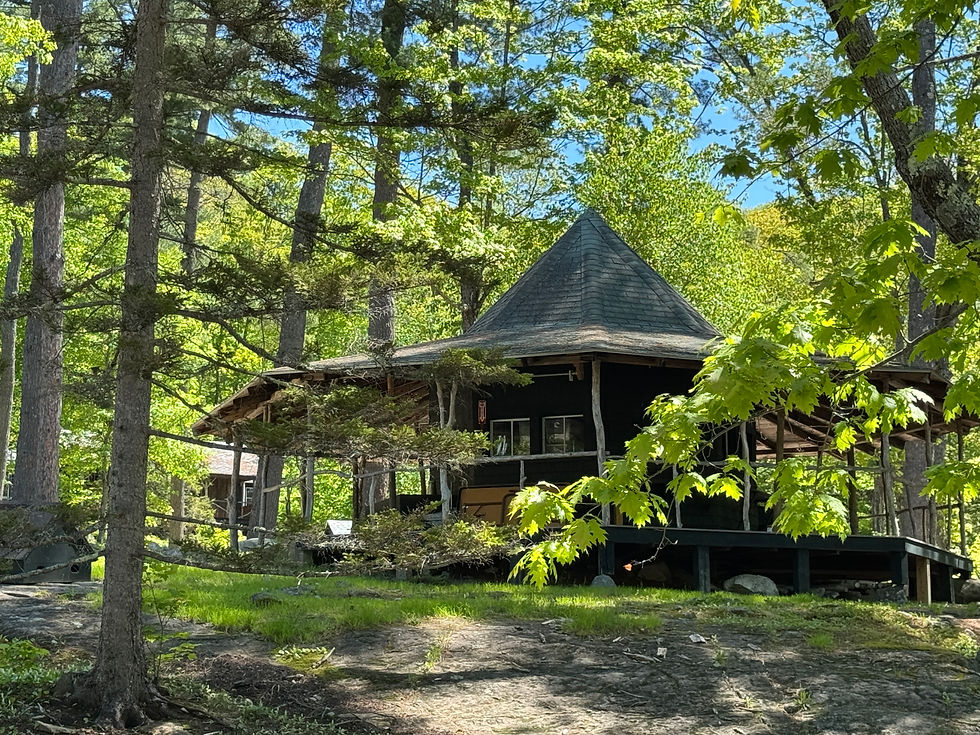Childhood Roots
- Neil Freebern
- May 28, 2025
- 3 min read
Updated: Jun 1, 2025

Reflections on Pasquaney
I'm sitting on the steps of Baird Hall at the camp I attended nearly 48 years ago, overwhelmed by the familiar scent in the air. It transports me instantly. The sound of birds, the distant murmur of water, and the lake view above the cabins—it all feels almost surreal. I remember the first day I arrived here in the summer of 1977. I'd never seen the place before. I stood in the parking lot as my mother said goodbye, terrified of what lay ahead in this strange new environment.

I was only 12 and placed in Wilson cabin, the second dorm on the left among a string of buildings that housed around 80 campers. I think I made friends quickly, but that first summer, I was mostly just trying to find my way. I remember spending a lot of time in Wilson Hall, the camp's playhouse. We did skits, put on plays, and I even sang a solo once—as a French maid in a skirt, no less. That performance probably led my father to question my manhood, but no, I wasn’t a cross-dresser—just a kid having fun on stage.

A couple of years in, I became the camp bugler. I'm not sure why I was chosen—there was another boy far better than me—but perhaps the counselors saw that I needed something to hold on to. I was a quiet observer, not very socially engaged, though I clearly remember the events: baseball games, hikes, sailing, and a deep love for the outdoors.

I remember those early cold showers I had to take before sunrise to play Reveille and wake the other campers. I did that for two summers. There was a special spot on the porch of the Birches dorm where I would stand and look out over Newfound Lake. Each night, after the Lord’s Prayer whispered through the camp, I would play Taps from this perch—stretching each note as long as possible, letting them fade slowly into silence.
Then, in stillness, I'd walk back to my bunk. Sometimes, someone would whisper—“Nice job, Freebern”—would be the last sound I heard before I climbed into my bunk.
The camp wove integrity into everything we did. Once a week, we’d sit beneath a great pine tree, overlooking the hill, and listen to counselors speak about honesty, joy, or doing the right thing. Nearby, there was a chapel where we processed every Sunday in our finest camp outfits. I remember the odd blue sock sleeves—“long blues”—worn over white socks to make them look more formal. We wore gray wool shorts with a thin blue ribbon in the seam, official t-shirts or tank tops with the camp’s signature “P” on the front. When you won competitions, you’d earn special shirts. I once served as the coxswain in crew the year we won, and proudly wore a tank top with two crossed oars and the year on the chest. I doubt it would fit me today, but it meant a lot back then.

The "treetalk" location on campus. This magificant white pine is no longer. A new pine grows in th distance. I love the symbolism.
As we got older, we were given more responsibility. I became involved in a leadership group at camp and aspired to be its president. There was another boy—better at nearly everything, with an infectious personality—who earned that role. I became his second-in-command. That dynamic, of striving to be the best and accepting that someone else might be better, followed me throughout life. It became a source of motivation rather than resentment. That spirit was shaped here, on these hills.

From the steps of Baird Hall, you can see all the dorms and the upper part of camp. I remember Howey, a beloved counselor, leading 110 of us in song. Our voices would echo across the landscape—it was magical. I learned to harmonize, to improvise. Between my bugle and those songs, it’s no surprise that music became a central part of my life.
Leaving camp after those eight weeks was always painful. I had made many good friends, and although I was naive, this place gave me my first taste of striving to be my best. That drive, I believe, was part of what the camp hoped to instill in us.

This place was a refuge from the social pressures of middle school. Those tough, formative years of becoming an adult were made just a bit gentler by this community. The lessons I learned at Pasquaney carried me through my life. My drive, my passion, my committment to being a good person all were formed on these hills.
This is where it all began. For that, I am forever grateful.












Comments